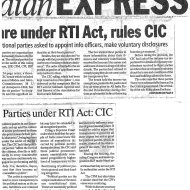
In a landmark decision, the Central Information Commission (CIC) Monday announced that political parties are public authorities under the Right to Information Act and directed all national parties to appoint information officers and provide information sought under the act within six weeks.
The CIC justified its ruling saying these parties are organisations that are substantially financed by the government. The national parties that come under the ambit of this ruling are Congress, BJP, CPM, CPI, BSP and NCP.
In its 54-page order, a three-member CIC bench which included CIC Satyanand Mishra and Information Commissioners M L Sharma and Annapurna Dixit, has directed the six parties "to designate CPIOs and the appellate authorities at their headquarters".
Besides, they are also directed "to comply with the provisions of the RTI Act by way of making voluntary disclosures". The order is limited to the six parties as queries of appellants were only marked to them.
The CIC ruling, which had been kept reserved on November 1, was delivered on the complaints filed by RTI activist Subhash Agarwal and Anil Bairwal of the Association for Democratic Reforms.
The two wanted these parties to share information about their finances and voluntary contributions received by them and the names and addresses of donors along with other details. The parties had refused to comply saying they do not come under the transparency law.
The bench held the income-tax exemptions granted to the parties and free air-time given by All India Radio and Doordarshan during elections as substantial indirect financing from the government.
Before taking the decision, the CIC had asked the income-tax department for details of voluntary contributions received by these parties and the urban development ministry about the terms and conditions of the land and buildings allotted to them.
The order says that these parties "have been substantially financed by the Central government. The criticality of the role being played by these political parties in our democratic set-up and the nature of duties performed by them also point towards their public character", bringing them under the ambit of the RTI Act.
The CIC held that political parties "affect the lives of the citizens, directly or indirectly in every conceivable way and are continuously engaged in performing public duty. It is, therefore, important that they become accountable to public".
The order is expected to lead to more transparency in the political system as the assets, liabilities and criminal records of those contesting elections are already in the public domain. While the order is limited to six national parties, its ambit may later be extended to all recognised parties.
Citing a Supreme Court order which held that the people of India must know the source of expenditure incurred by political parties during elections, the CIC said these judicial pronouncements unmistakably command progressively higher level of transparency in the functioning of political parties in general and their funding altogether.
"Political parties are the unique institution of the modern constitutional state. These are essentially political institutions and are non-governmental. The uniqueness lies in the fact that in spite of being non-governmental, they come to wield or directly and indirectly influence exercise of governmental power. It would be odd to argue that transparency is good for all state organs but not so good for political parties, which, in reality, control all the vital organs of the state," the bench has said.
During the hearing, the ruling Congress and main opposition BJP made bland assertions that they are not public authorities under the RTI Act. The CPM had also taken a similar stand but the CPI's views were confusing. While its former secretary general A B Bardhan had conceded that the party is a public authority, the incumbent, Sudhakar Reddy, had contradicted that stand.

